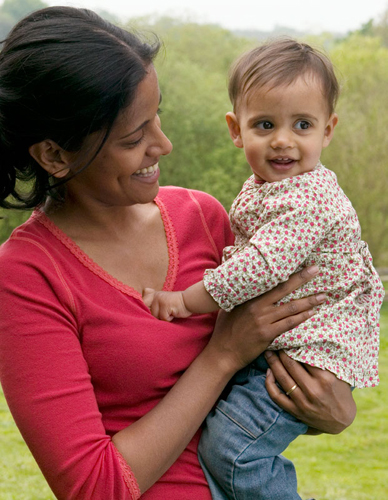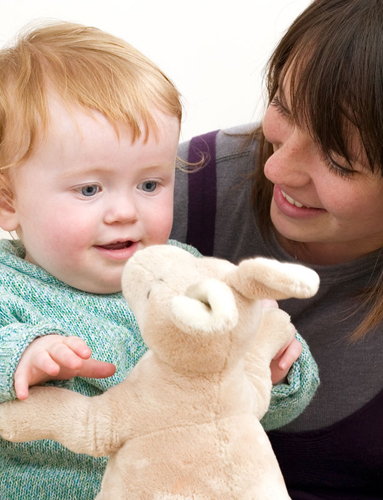Your baby’s first birthday will be a major milestone
for all of you. Just when you think you have your routine figured out,
and know what to expect, your rapidly developing baby may start to
resist your attentions and show every sign of developing an independent
mind. Welcome to the toddler years!
“The first year was a
challenge, but then my baby began to develop a real personality, and it
made all that hard work worthwhile.”
—“The first year was a
challenge, but then my baby began to develop a real personality, and it
made all that hard work worthwhile.”
“Parents, like children,
will improve their skills by learning from their mistakes. Remember
that love and affection are more powerful than perfection.”
“I expected to be a
natural earth-mother type. What a shock to find I was so nervous and
worried about being a parent. The first few months were a real challenge
and it took a while to bond with Zak.”
—“I expected to be a
natural earth-mother type. What a shock to find I was so nervous and
worried about being a parent. The first few months were a real challenge
and it took a while to bond with Zak.”
The first twelve months
of parenting are always memorable and during this time you will have
developed beliefs about yourself as a parent and about your baby’s
personality, likes, and dislikes. If you had an easy time in the first
year, you may find the toddler years a bit of a shock as your baby
transforms into an independent soul. If you had a more challenging
time—coping with nighttime waking, feeding problems, postpartum
depression, or other issues—you may be relieved by the new phase.

Reflecting on your experiences
Your young baby will have
been completely, totally, and utterly dependent upon you for her every
need. This may at times have felt overwhelming and frightening, as well
as enjoyable. How you responded to this challenge, and your overall
experience of the first year of parenting, will inevitably impact on
your relationship and parenting style.
"“It’s been perfect. We
are so lucky. Amy sleeps through the night and is happy to be left with
my parents during the day. The last twelve months couldn’t have been
easier.”" For some fortunate parents the first year is quite calm and
trouble free. However, if your baby slept through the night and you had
no significant problems, be prepared for change. It is completely normal
for your baby to start to become less compliant as she develops; this
change shouldn’t be mistaken for “bad” behavior.
"“It has been a mixture of
joys and challenges, but on the whole the first year has gone well and
we still find time for ourselves.”" If you managed to get through the
tough times, and have achieved a balance between making your baby a
priority and having a life yourself, this will stand you in good stead
for the ups and downs that you will face in the toddler years.
"“Lucy is the center of our
world. I know we are spoiling her, but she is only a baby.”" It is
natural to want to spoil your newborn baby, especially if she is your
first child. However, if you get into a habit of being very overly
permissive with your child you can end up creating problems for later
years. As your baby develops into toddlerhood she will need to be given
clear boundaries so that she learns how to behave and stay safe, and so
that you maintain control.
There is also a danger
that in becoming totally focused on your child, your sense of
fulfillment may come solely from her achievements. It is important to
make time for your own interests to avoid putting undue pressure on your
child to fulfill all your needs and expectations. Inevitably both
parent and child will suffer feelings of failure and disappointment if,
at a later stage, things don’t turn out as planned.
"“I have felt quite
depressed and isolated. I can’t help feeling that everyone is judging me
and that other people’s babies are developing faster than mine.”" Most
parents tend to worry about what people think and will to some extent
try to present an ideal picture to the outside world. In reality, no
child is perfect and all parents have worries and challenges. If you
feel isolated and have no one to confide in, there is a danger that life
will become a real challenge once your baby becomes a toddler and is on
the move. Your mood can impact on how you bond with your baby and so
social support and professional support are vital if you are feeling low . Planning and building a support network are essential to help you care for your child through the toddler years.
"“We have been amazed at
how fast our baby has developed. He is chatting away and can nearly
walk. We want to encourage his development to give him the best chance
in life.”" Wanting to encourage and nurture your child’s development is a
good thing. There is, however, a difference between nurturing and
pushing. Children develop at their own rate, and pressure is unhelpful.
Encouragement, however, is good.
How was your first year of parenting?
The following questions
will give you a starting point from which to consider the effect that
your baby’s first year has had on you, and how your experiences may
affect your relationship with her. The answers will give you a chance to
consider how you feel about yourself as a parent, how you view your
baby, and how you want to approach the next stage of parenting.
In each situation,
consider how your feelings have affected your relationship with your
baby and your feelings about yourself as a parent. Is there anything you
would like to change? What has struck a particular chord with you, and
what might you like to approach differently in the future?
Postpartum recovery
Your experience of childbirth will have a direct effect on your early relationship with your child.
What kind of delivery did you have?
Were there any complications, such as a premature birth, or illness?
How long did it take you to recover from the birth?
How did you feel in the early weeks and months of parenthood?
Did you bond with your baby during the first three months or so?
Caring
In the first year,
parents are intimately involved in the care of their baby. Personal
“success” or otherwise, at each stage, will impact on the way you feel
about yourself as a parent.
How she learns
Watching your baby discover her world is one of the most
fulfilling aspects of parenting, but let her develop new skills at her
own pace.

What were your
experiences of breast-feeding? For example, did you enjoy it or find it
difficult? Was it painful and problematic?
What were your experiences of bottle-feeding? Did you find it easy?
Or was it tinged with guilt because you weren’t breast-feeding?
Have you begun the process of weaning off the breast or bottle?
Was it difficult to get your baby to settle, or stop crying?
How were her early sleeping habits? Did she sleep through the night?
Development
Interacting and playing
with young children at their pace and at their level is the best way to
promote development. Avoid treating them as miniature adults. It is
through play and exploration that children develop their inquisitive
nature and enjoy learning and developing new skills.
How much time do you spend playing with your baby and having fun?
What kinds of responses have you had from her?
Do you compare your baby with other babies?
Do you socialize with parents who have babies of the same age?
Do you communicate regularly with your child in baby language, or with adult words—or use both?
Do
you find you are labeling your baby in a way that could influence your
parenting style—for example, as “difficult” or “perfect”?
Relationships
The quality and style of
your relationships with other key adults in your baby’s life will affect
your parenting style. Think about the basis for your relationships and
whether they are, for example, cooperative, confrontational, passionate,
compliant, or controlling.
How do you relate to your partner or significant others in your life?
What is your relationship like with other children in the family?
Do you enjoy your relationship with your parents and in-laws?
Are
there any other significant people who are influencing or impacting
your baby’s life? How do you feel about your relationship with them?
Work
Most parents have
concerns about combining work and parenthood. Financial pressures are
such that few people have a choice, and at some point will be trying to
juggle two very different parts of life.
Were you primarily at home or at work during your baby’s first year?
How do you feel about the balance between your work and home life?
How do you feel about your choices for the year ahead?